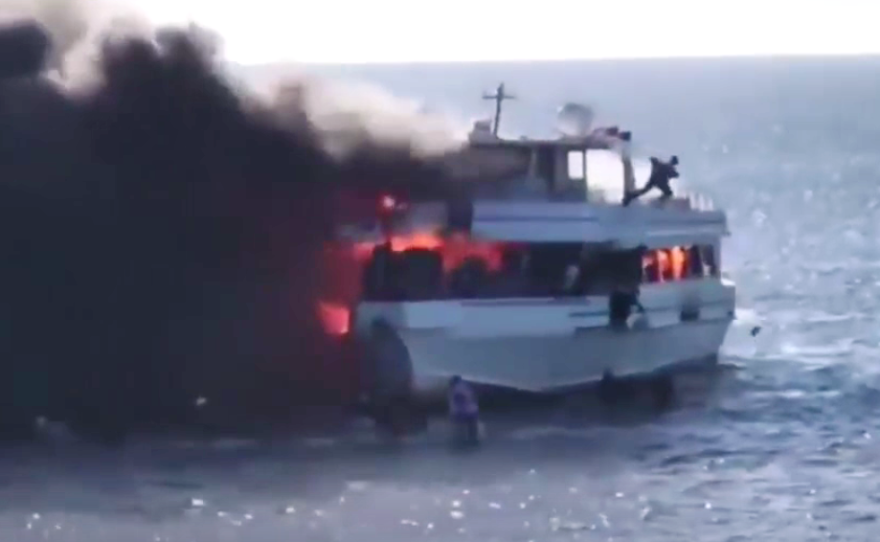The National Transportation Safety Board on Tuesday ripped into the company that owned a casino boat that caught fire off Pasco County in January, killing one woman.
Board chairman Robert Sumwalt noted the company had a similar fire on a boat fourteen years ago. He reacted after hearing testimony that the company has not improved its safety regulations since Carrie Dempsey, a 42-year-old mother of two from Lutz, died after the flaming boat ran aground earlier this year.
"It's easy to say one passenger died. It's just an abstract number. But it's not an abstract number. This person who died was a single mother, she left behind a pair of twins, a boy and a girl, who were 12 years old, who now do not have parents," Sumwalt told the board.
"And here's a company that had the opportunity to learn from a tragedy in 2004. And they did absolutely nothing. And after it happened twice? What have they done? This is absolutely absurd."
-_jI
The Jan. 14 fire broke out because a fuel leak that sparked a fire. The captain was lauded for turning the boat around and running it aground on a beach, allowing the 50 passengers to jump into the water. Dempsey later died in a hospital.
The company was ripped by board members for not tracking the number of hours the engine ran, so it couldn't keep tabs on when sensitive engine parts needed to be replaced. The company, Tropical Breeze Casino, was also castigated for not sufficiently training the crew to respond to emergencies.
"The passengers who went out that Sunday, they went out to gamble," Sumwalt said. "But they did not expect to gamble with their lives. And that's what happened. Because this organization did not have an effective preventative maintence program in effect."
The NTSB board plans to recommend that companies operating small passenger vessels have improved safety maintenance systems. They also plan to ask the Coast Guard to overhaul its marine firefighting training programs.
Here's an excerpt from their report:
Lack of company guidance regarding engine high-temperature alarms:After the captain received a high-temperature alarm for the port engine’s jacket-water system, he did not shut down the engine but instead left it idling. Doing so allowed the overheating engine to continue to generate excessive heat, which in turn affected the exhaust tubes and ignited their surrounding structures. Tropical Breeze Casino Cruz did not provide specific guidance to its vessel captains about how to respond to high-temperature alarms. Lack of fire-detection in unmanned spaces with exhaust tubing:Although federal regulations require small passenger vessels to have fire detection and suppression systems in spaces containing propulsion machinery (such as engine rooms), the regulations do not require such systems in unmanned spaces with engine exhaust tubing. The fire on board the Island Lady most likely started in the lazarette―an unmanned space aft of the engine room―through which the exhaust tubes led toward the vessel’s stern. Because there was no fire in the engine room initially, activating the vessel’s fixed fire-suppression system for that space would have served no purpose; further, activation would have caused the vessel to needlessly lose all available propulsion during the emergency. Insufficient preventive maintenance:Although Tropical Breeze Casino Cruz stated that it implemented a preventive maintenance program after a previous fire on board a company vessel (the Express Shuttle II) in response to an NTSB safety recommendation, the quality of the program was insufficient. The US Coast Guard does not require small passenger vessels to have preventive maintenance programs and, importantly, even when such programs are voluntarily in place (such as in this case), the Coast Guard provides no enforcement oversight. Insufficient crew training and documentation:The investigation revealed that the Island Lady crewmembers lacked sufficient understanding of firefighting principles and that their training drills were infrequent or not completed. In addition, records pertaining to crew training drills and daily maintenance checklists were kept only on board the vessel and were lost in the fire; no duplicate records were kept ashore. Inappropriate material and design of fuel tank level-indicator system:Counter to Title 46 Code of Federal Regulations182.440 (a)(7), the Island Lady’s fuel tanks were equipped with plastic hoses used as fuel level indicators; further, the system did not have automatic shutoff valves. As a result, during the fire, the plastic material melted and the release of diesel fuel exacerbated the fire.







